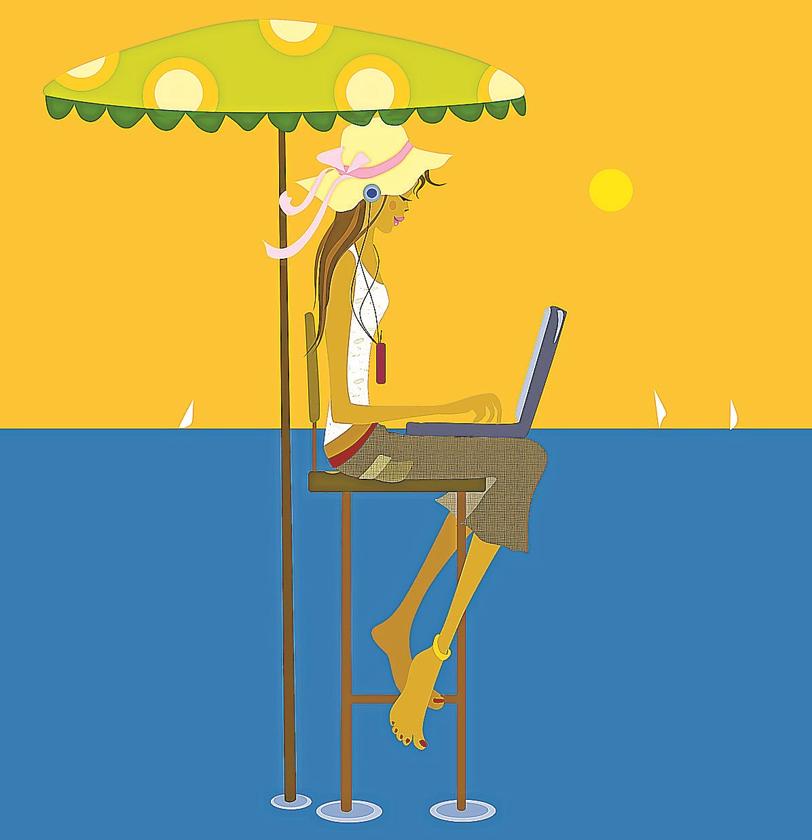Do we really switch off when on holiday?
Taking a proper break from time to time regenerates the body, activates memory and reduces our stress levels
Isaac Asenjo
Madrid
Friday, 16 August 2024, 14:16
Come September most people will be back in the office or wherever they work, arriving in dribs and drabs from their vacation. Pulled back into the daily routine. We already know that it costs to come back down to earth. However, it's very important to ask this question: have you at least managed to switch off completely in August? It seems almost impossible not to disconnect while stretched out on the beach just looking at the sea. Nevertheless, is it really that simple? Do you really turn off the computer and forget everything?
Well, it's not that easy, or at least not for everyone. A call from the boss in mid-August that makes you momentarily 'return' to the office, those work emails that keep dropping into your inbox. How many people does this happen to? More than you think.
Related article
It's not enough to switch off that smartphone
The most recent survey (2022) carried out by TopDoctors on summer's effect on our physical and mental wellbeing confirms that 75% of people cannot fully disconnect while on holiday. Another statistic along the same lines and closer to home: according to a report by InfoJobs, 64% of Spanish workers answer calls or emails during their time off.
Now, stop thinking about work and just look out for your health: the brain needs a break, a proper holiday. The advantages of taking this break are important: going on vacation regenerates the body, activates memory and helps us reduce chronic stress levels. These benefits are noticeable even before the out-of-office goes on.
"Simply looking forward to a future reward can be even more rewarding than having it. It is thanks to a small molecule called dopamine," explains Javier Tubío Ordoñez, professor of the Master's programme in Neuropsychology and Education and researcher in the Neuroscience applied to the educational context group at the International University of La Rioja (UNIR).
Take a break every three months
So that holiday you have just enjoyed (or maybe you're still on it?) has done a world of good for your mental health as taking such a break reduces chronic stress levels. How? By being idle for a while our brain is able to reverse, at least temporarily, the negative effects of being stressed out and thus stay more motivated. As such, and in order for the promise of some holiday not to be too distant a prospect, Prof Ordoñez believes that the ideal is to be able to enjoy some time off approximately every three months.
"We must do something different, something that restores us at least one weekend every two months. Something that keeps us hanging on for its arrival," suggests Inés Valderrábano, psychologist at the Instituto Psicológico Cláritas (a private, clinical practice of psychologists based in Madrid). She also recommends making plans to do something you enjoy, even if those plans are more modest than going on vacation, perhaps something done once a week to "recharge your batteries."
We must do something different at least one weekend every two months, something that fulfils us
Don't get hung up on planning the perfect break
It may seem that, once you have some holiday time booked, it's all done and dusted, so all that remains is to sit back and enjoy. That could be the case, but sometimes stress around the holiday planning crops up: so much to prepare, recurring doubts about the chosen destination, or maybe because the plan is not the one we most want to follow.
"Maybe it is a tradition for everyone to spend summer at the family-owned house in a village in the Levant, but someone has grown weary of that plan or just doesn't like the idea. What happens then? Well, it will require effort and incur some stress to say no and not let ourselves be pushed into it just because the rest of the family is annoyed by this," advises Valderrábano.
Right, so we have decided to go for a change of scenery, to leave the rest of the family in the Levant and to head to another destination, but which one?
"When we choose the place to spend our holiday, we should not be swayed just because it seems like a good place to take a selfie or because that destination is trendy at that moment on social media," says Tubío.
The specialists are all clear on this point: we should not obsess over the perfect getaway or plan everything to the last detail as this will only lead to frustration if expectations are not met. Moreover, all of this will only increase your stress levels and those of the people around you.
The 'downer' on those first days
Let's say you've overcome - maybe even dodged - the stress of planning that holiday. Now we have to avoid another issue: the depression that many people suffer during the first days of relaxing, the moment that we stop.
"While working at a fast pace, the levels of cortisol and adrenaline – the two hormones related to stress – are high. Adrenaline makes our immune system stronger and cortisol acts as an anti-inflammatory, all so that we can endure long workdays. On the other hand, when we enter 'vacation mode', these hormone levels decrease, so our immune system becomes depressed and we can fall ill more easily or have some health problems," states Silvia Sumell Canalda, professor of Studies in Psychology and Education Science at the Open University of Catalonia.

